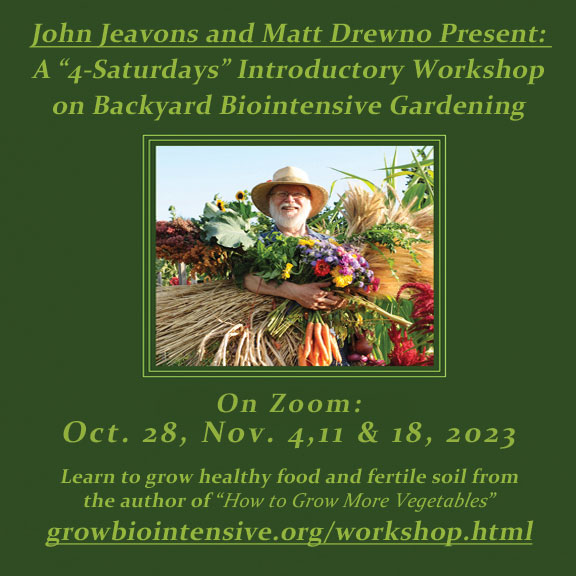The Jeavons Center Mini-Farm Report
Image: The site of the Common Ground Mini-Farm at The Jeavons Center, in January 1982 At The Jeavons Center (TJC, Ecology Action’s GROW BIOINTENSIVE® Closed-Loop Sustainable Mini-Farming world headquarters), things have been busy as always! Heading into summer, we continue to grow fertile soil in an area of difficult serpentine soil rated “fair for grazing” by the NRCS. In fact, our FTT team has been able to grow a stable
climax ecosystem using GROW BIOINTENSIVE (GB)
in just 37 years, using annual crops, confirmed by
independent soil tests which show the amount of organic
matter in our mini-farm soil to be equivalent
to that which would take an uncultivated ecosystem
hundreds of years to achieve. A climax ecosystem is
one in which ecological succession has taken place,
changing the mix of species and habitat and soil
composition in an area over time, with the less stable
communities gradually replaced until a stable,
mature community is reached – like a established
forest where a mix of scrub used to be, or in this
case, a flourishing garden where thin, nutrient-poor
grass once struggled to grow. The thing is, climax
ecosystems normally develop with perennial plants,
and the process takes hundreds of years. Years ago,
at a meeting with representatives from TJC, Victory
Gardens for Peace, and the Golden Rule Community,
one of our former FTTs, Rachel Britten, asked an
inspired question: “I wonder if a climax ecosystem
can be grown with annuals using GROW BIOINTENSIVE?”
…and it turns out that the answer is “Yes!”
as you can see from the following pictures. And the work is ongoing: now in our 52nd year on our hillside
outside Willits, CA, we’re continuing to nurture our
mini-farm ecosystem by testing the strengths and
less desirable aspects of using four different types
of compost on Growing Bed 21. What began as a test
to determine the nature and usefulness of different
carbon:nitrogen ratios in compost, the results of this
study may be used to show people how to hold more
water and nutrients in the soil – an important piece
of information for the five billion people, or around
two-thirds of the world’s population, who will face
severe water shortages by the year 2050.
Image: Progress at the Common Ground Mini-Farm at The Jeavons Center, August 1982: More details about this and many other interesting facts about GB and our research are in my latest book The Next Steps, which I hope to have published by the end of the year, including what types of alfalfa will grow best and the advantages and challenges gardeners should be aware of as the plant concentrates nutrients from deep in the soil; why Grizzly Dormant Alfalfa is the best; and how Banner Cold-Weather Fava Beans are most productive. (Note: sadly, both Grizzly and Banner seeds are rare, and difficult to find on the internet. You can do something about this if you can manage to find some of these seeds and grow them out to save, use and share. Why not become a Living Seed Bank in your region?) On June 3, TJC’s Farmer/Teacher Trainer Team (Manager Melvin Castrillo specializing in overview, and FTTs Suraya David Sadira specializing in compost and herbs, and Jessi Mickow, specializing in soil preparation) gave a tour of our site to a delightful group of interesting and motivated people from diverse locations – one each from the California communities of Laytonville, Fort Bragg, Davis, Sebastopol, and Fremont, and one from Gardenville, Nevada. A wonderful couple from Japan attended as well, interested in increasing Japan’s farmable soil from 1,246 sq.ft. per person to 70,000 square feet, the area it takes to grow the mainly imported Japanese diet. They told us many young people in Japan are interested in embracing an organic and sustainable way of farming. They inspired us! Tour topics included: the philosophy of GB and its Eight Essential Elements, growing bed soil preparation, composting, an herbal tour, and discussion of interesting facts like number of calories one gallon of water can produce (see p. 99 in How to Grow More Vegetables), and the optimal conditions for raising healthy seedlings — with many information sheets given out from Ecology Action’s extensive publication list. Books, booklets, and DVDs were made available as well. On June 6, we enjoyed a visitor from Paris, France, who had previously taken a 4-Saturdays Online Workshop and had been inspired to pre-arrange a visit to see our work in person.
Images:
It can’t be denied that our world is facing a lot of challenges, and that we’ve got our work cut out to build a sustainable and abundant future. But as the cool mist of spring recedes and the warm, dry days of a Northern California summer begin, looking out at the vigorous, joyously ALIVE mini-farm, growing sustainably, year after year, in soil that wasn’t supposed to be able to support it, I feel like a good overall theme for approaching life might be seen in Raymond Williams’ reflection from Resources of Hope (1989, p. 118): “To be truly radical is to make hope possible, rather than despair convincing.” Sounds good! Let’s be truly radical together, wherever we are!
Image: July 1995 - 14 years of GB cultivation at the Common Ground Mini-Farm, new soil fertility plateau achieved Our next 4-Saturdays Workshop taught by John Jeavons and Matt Drewno will be held online Oct. 28, Nov. 4,11 & 18, 2023. I hope to see your smiling faces there. Happy Gardening, and Happy Summer to our global GROW BIOINTENSIVE Family from the Ecology Action team! Grow Hope Grow Abundance Grow Biointensive! ♥ top | Newsletter Home |Table of Contents| Archive
|








